#Housing Society Resident Welfare
Explore tagged Tumblr posts
Text

#RWA Full Form#RWA Rules and Regulations#Resident Welfare Association#RWA Guidelines India#Housing Society Rules#Apartment RWA Roles#RWA Responsibilities#Residential Society Management
0 notes
Text


While the media and the new Democrat Party grow hysterical over the Trump counter-revolution, they are missing some of the most revolutionary and insidious changes in American society of the last century.
Much has been written about the collapse of the old orthodox Democratic Party, along with the growing irrelevance and dysfunction of the legacy media, elite universities, and state and federal agencies. But their growing unattractiveness is all related and was not just the result of top-down development.
Rather, current Democrat Party radicalism, street theater, and violence were merely reflections of its own preexisting cultural antipathy toward the middle class. The party is now a pyramidal coalition of the very wealthy and professional classes comprising the capstone, resting atop a vast, expanding bottom of the subsidized and working poor, strapped pensioners and retirees, angry indebted students, 30s-something urban wannabees, impoverished immigrants—including perhaps 30 million here illegally—and, increasingly, trapped residents of a dystopian big-city America.
The collapse of the blue-state/blue-city model and those who work within and promote it reflects the radical environmentalism of the college-educated, as well as an array of high taxes, high crime, endless government regulations, housing shortages, massive homelessness, illegal immigration, critical-legal-theory prosecutors, ethnic and racial chauvinism, defund-the-police city councils, and, most importantly, chronic budget deficits and vast, unfunded pension liabilities and obligations.
In response to this progressive implosion that accounts for Democrat Party unpopularity, under the radar are historic demographic shifts. They reflect two insidious phenomena.
One, the blue-state, urban/professional/college-educated profile has become antithetical to fertility.
No one knows exactly the contributory relative roles to childlessness played by the progressive embrace of abortion on demand or secularism and atheism. Certainly, the fixations on higher education certification, massive student loan debt, years of student limbo, prohibitive housing prices, and a cultural value system that places status, titles, careers, and degrees over children all further promote a declining birthrate.
But in the end, the cause of asymmetrical fertility does not matter: red-state, traditional populations are simply growing, while blue-state fertility remains stagnant.
Second, we are witnessing the greatest internal migration in U.S. history since the post-Civil War era. Millions are leaving California, New York, New Jersey, Pennsylvania, Minnesota, Illinois, and other northern blue states. And they usually head to Florida, Texas, Tennessee, South Carolina, and other red, low- or no-tax states. So large have become the dislocations that conservative red states will in the next decade grab some 10-12 congressional seats away from liberal blue states along with some 10 or so votes in the electoral college.
The trends are not static but occurring at a geometric rate. The upper-middle and professional classes head to states with perceived lower crime, lower taxes, fewer regulations, better schools, and more affordable housing. Meanwhile, those left in blue states to pay the tab for the subsidized poor and expanding social welfare overhead shrink. For these remaining, the burdens per capita surge—in turn feeding even more exoduses.
We also may be witnessing soon the de facto implosion of a once affluent California—its growing poverty already visible in its decaying roads and infrastructure, dangerous and substandard public schools, soaring property crime, overcrowded, dysfunctional, and dangerous health care system, ethnic fragmentation, and the general bankruptcy and medievalism of San Francisco and Los Angeles.
Those left to pay for its escalating social welfare costs and debt service are beginning to lament that the advantages of the state’s climate, beauty, and once upbeat culture are no longer worth the downsides of its costs: big-city homelessness, decayed infrastructure, incompetent government workforce, crime, and general social dystopia.
In California, 50 percent of all births are now paid for by Medi-Cal, which serves 40 percent of the state. And yet the health welfare system is flat broke, nearing $7 billion in the red. California has the highest taxes in the nation at 13.3 percent (plus an additional millionaire’s tax). Its sales and gas taxes are also among the nation’s steepest, while utilities charge the highest gas and electricity rates in the continental U.S.
These disequilibria are increasingly unsustainable.
One percent of Californians pay well over 50 percent of the state’s income taxes—and is leaving in droves. Power is exorbitant, in part due to inefficient solar/wind/green mandates, restrictions on oil, natural gas, nuclear energy, and new hydroelectric production.
In addition, some 4 million—or nearly 25 percent of utility users—simply no longer pay their monthly power bills and are yet usually not subject to cutoffs of power. They in turn must be subsidized by a shrinking number whose rates climb almost yearly.
There are two general rules of California’s liberal, uni-party politics that symbolize the collapsing blue-state model: all know that the open borders and the generous welfare subsidies of the state explain why half the nation’s illegal immigrants flocked to California, almost all in need of massive government aid.
And two, given the political demographics of a minority/majority state, it is political suicide to associate that 50-year massive influx with vast unfunded social service liabilities, poorer schools, rising crime, and the creation of an all-powerful ultra-left-wing government.
The California model addresses inequality not by insisting on legal-only immigration, rapid assimilation, integration, and acculturation of immigrants. It does not acculturate by back-to-basics K-12 schooling to ensure an emerging younger workforce competent in oral and written English, math, and civic education.
Instead, any resulting disequilibria brought about by the sudden vast influx of some of the world’s poorest is explained by systemic racism and unearned “privilege”—and thus to be remedied by DEI therapeutics. Rather than fighting the left to acculturate 27 percent of the resident population that is foreign-born and prepping them to help run a once sophisticated and complex state government, each year hundreds of thousands of exasperated Californians just flee.
Moreover, California is thought to have one of the largest underground economies of the 50 states, likely reflecting that its huge foreign-born and mostly poorer population is struggling economically. In the Central Valley, it is not unusual to see thousands of residents shopping at vast weekend swap meets, eating regularly at local, ad hoc roadside canteens, and buying everything from flowers to bicycles from entrepreneurial vendors that dot almost every busy rural crossroads. Most of these exchanges are not recorded for either sales or income tax purposes and pose a huge loss of revenue for the state.
Another blue-state pathology is the asymmetrical application of the laws. And California again reflects this trend of being the most overregulated and underregulated, the most lawful and lawless state in the nation. Its upper-class coastal elite insists upon the nation’s strictest zoning and green regulations. (Gavin Newsom used the voter-approved multibillion-dollar water construction bond not to build a single reservoir as mandated, but rather to blow up four existing dams and lakes.)
The result makes it almost impossible to build new power plants, housing developments, freeways, dams, reservoirs, aqueducts, or even to either finish or quit the monstrous high-speed rail, multibillion-dollar boondoggle.
Half the state, mostly its poorer and immigrant population, largely seeks to bypass these cumbersome regulations. It is almost impossible to travel through the state’s interior and not see single-family homes with surrounding shacks, trailers, and lean-tos with substandard, illegal wiring, plumbing, and sanitation. Semi-rural homesteads that traditionally housed one family may now include four or five.
The regulatory agencies of the state exempt the poor from their massive violations of housing and building codes. They compensate for their dereliction by redirecting their energies instead to auditing the shrinking number who follow the laws and will pay fines if cited—yet another reason why the more affluent flee California.
I once asked a building inspector who arrived to certify an upgraded solar breaker box whether he was aware that a mere half-mile away, twenty or so people were living in what was once a single-house compound. Sagging Romex wire without conduit was visibly strung to a number of parked trailers, all without toilet facilities. When I asked him why not venture into that complex, he flashed, “I’m not crazy, sir.”
The result is a growing cynicism in California, as in all the blue states. Left-controlled city councils, state legislatures, universities, and executive agencies promote the narrative that the wealthy are greedy, selfish, and ‘don’t pay their fair share.’ The problem with that strategy of blame-gaming the more successful is that it is starting to run out of the more successful. As revenue shrinks and deficits climb, shouting at the increasingly diminishing upper-middle class only makes them more resentful and determined to leave.
In the current conundrum, we have forgotten completely the old themes of a blue-state Democrat Party. The 1996 Democratic National Convention manifesto that spearheaded Bill Clinton’s successful reelection emphasized secure borders, legal-only immigration, tough crime enforcement and punishment, balanced budgets, fiscal responsibility, and “personal accountability.” That agenda today in California would condemn any adherent as a racist, xenophobe, or MAGA fanatic.
In its place, the party became more intolerant, narrower in its cultural emphases, and uninterested in existential crises such as housing, secure borders, power generation, infrastructure, and crime. Without answers or correctives to the damage it inflicted, it instead focused on what was largely seen as irrelevant to the state’s struggling minority populations—LGBT advocacies, transgendered men competing in women’s sports, racial reparations, DEI-mandated programs, and boutique environmentalism.
The result may be that Californians no longer really believe there is a political solution to their crises and fleeing is becoming the only viable option—for those who can afford or are willing to move. Those left are inured to their dogmas that “they”—the allegedly culpable and greedy—will always remain so rich, so selfish, and so always a part of California, California that the government income streams will remain limitless to fund redistribution.
The only mystery is whether other blue states following California’s disastrous lead will pause and pivot, or are also already too far gone to make the necessary adjustments.
In addition, the growing dysfunction and irrelevance of the mainstream media—from network news to the old print conglomerates—of elite universities and of the federal government itself are, in part, due to their location in and symbiosis with the dead-end, blue-state model of culture, economics, and politics.
In sum, America is entering a historic reversal.
The old traditional impoverished South is becoming the engine of American prosperity. The Northern Midwest, the Northeast, and the West Coast—for a century the font of American dynamism—have become stagnant and inert, and are shrinking.
These blue loci survive for a while longer on the fumes of the work of past generations who operated under completely different assumptions and models antithetical to those of the present—and thus are regularly damned by those who squandered their once-rich inheritance.
3 notes
·
View notes
Text

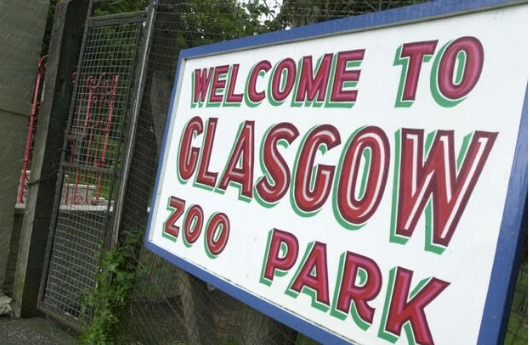

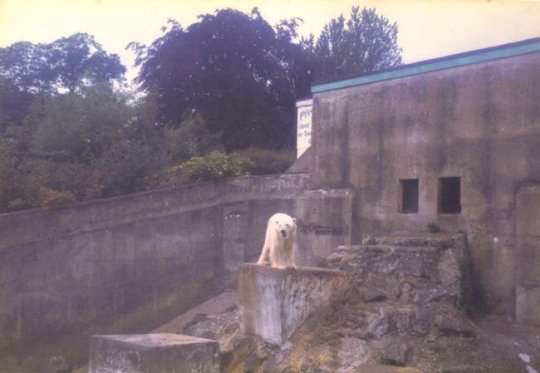

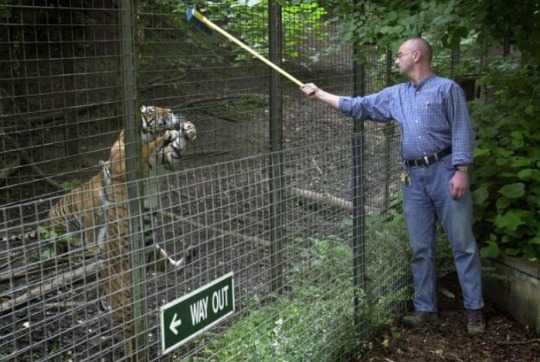
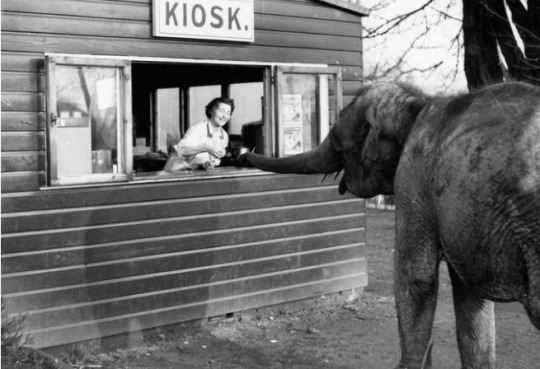
On July 9th 1947 Glasgow Zoo opened.
Established by the Zoological Society of Glasgow and West of Scotland, the zoo was located on the old Calderpark Estate in Baillieston.
During its peak, the zoo housed more than 600 animals and attracted around 140,000 visitors per year, but in the end, however, the organisation found itself running out of money, with its facilities falling into disrepair and the safety of its animals being called into question.
Bellahouston Park (to the south west of Glasgow city centre) was the first proposed site for the new Glasgow Zoo in 1938, but this was rejected by project funders.No suitable site within the city centre was found, and by 1939 the Zoological Society had purchased Calderpark Estate, around 10 miles from Glasgow.
Lions were a big draw for visitors to the zoo in the early days.
Because of World War Two, the zoo did not open until 1947, and many of its enclosures were built from war materials, such as concrete roadblocks and former air raid shelters.
Many of Glasgow Zoo's original animal residents were donated from other zoos and sanctuaries, including Soay sheep from St Kilda, and lions from Dublin and London.
Some visitors even brought along their own exotic pets to add to the zoo's collection, such as parrots and monkeys.
Interestingly, Glasgow Zoo was spread over 99 acres of land, compared to the longer lasting Edinburgh Zoo's 82 acres. In this space, the Glasgow wildlife park housed a range of mammals, birds, reptiles and farm animals. African lions, golden eagles, white rhinoceri, basking sharks, Indian peacocks, Capuchin monkeys, Asian black bears, several snakes and a polar bear were just some of the exotic animals that brought in many visitors over the years.
By the late 1990s, money had begun to dry up as visitor numbers dwindled and public funding tailed off.
To combat this, the zoo unsuccessfully attempted to sell off its unused land, as well as hiring out some of its animals - a move which was criticised by animal welfare campaigners. Animal rights groups became more interested in Glasgow Zoo, and a report from Advocates for Animals (now OneKind) made claims of animal cruelty and reported substantial annual losses.
At the time, Samantha Scott (an animal behaviourist at the Royal (Dick) School of Veterinary Studies in Edinburgh), said that the zoo's white rhino showed "signs of possible stereotypic behaviour (circling), which is normally associated with difficulties in coping with captive life, or frustrated territorial patrolling."
Several break-ins saw the theft of two non-poisonous snakes and a parrot in 2002. Ultimately, Glasgow Zoo closed in August 2003 - earlier than planned, largely due to the organisation's large debts.
The zoo's animals were relocated, and claims from the Zoological Society that the space may re-open never came to fruition.
The old zoo site remained untouched for many years, and its enclosures and buildings were vandalised and burned, until the land was cleared to make way for new homes.
Today, there are very few reminders of Glasgow Zoo left, despite the large number of animals it once exhibited and high volume of visitors it once had.
Looking at the pictures I am not sure what to make of them, the conditions didn’t look appealing for the animals, nor visitors, but it is hard to get a handle on it.
10 notes
·
View notes
Text

Professor Roger Wood Wilkins (January 29, 1932 – March 26, 2017) was a lawyer, civil rights leader, professor of history, and journalist who served as the 15th US Assistant Attorney General under President Lyndon B. Johnson (1966-69) one of the highest-ranking African Americans ever to serve in the executive branch up to that time.
A member of the Democratic party, he was mentored by Associate Justice of the Supreme Court Thurgood Marshall. He campaigned for the passage of the Civil Rights Act of 1964 and the Voting Rights Act of 1965. In 1965, President Lyndon B. Johnson appointed him to be the administration’s chief troubleshooter on urban racial issues. He worked as a welfare lawyer in Ohio before becoming the USAAG. He was sworn in as Director of the Federal Community Relations Service on February 4, 1966, in a ceremony at The White House.
His uncle, Roy Wilkins, was the executive director of the NAACP (1964-77). He was born in Kansas City, Missouri, and grew up in Michigan. He was educated at Crispus Attucks Elementary School in Kansas City, Missouri, and Creston High School in Grand Rapids. He received his AB in 1953 and JD in 1956, both from the University of Michigan, where he interned with the NAACP and was a member of the senior leadership society, Michigamua.
He worked for the Ford Foundation before joining the editorial staff of The Washington Post. He earned a Pulitzer Prize in 1973 for exposing the Watergate scandal. He left the Post in 1974 to work for The New York Times, followed by a brief stay at the now-defunct Washington Star. In 1980, he became a radio news commentator, working for NPR.
He was the Robinson Professor of History and American Culture at George Mason University until his retirement in 2007. He was one of the most preeminent professors in residence at that time. He was the publisher of the NAACP’s journal, The Crisis.
He was married to Patricia King, a Professor of Law at Georgetown University. #africanhistory365 #africanexcellence
2 notes
·
View notes
Text
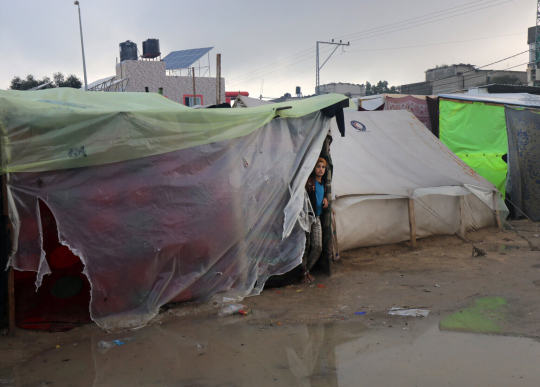
Meanwhile, nearly half of the territory’s 1.9 million residents are seeking shelter in the Rafah governorate area in southern Gaza. On Wednesday, heavy rain encompassed the Strip, filled with displaced people, worsening the already miserable and dangerous situation as people do not have adequate clothing, electricity, or shelter. “My son is sick because of the bitter cold and my daughter is barefoot. It’s like we are beggars,” Aziza al-Shabrawi, 38, told Al Jazeera, “No one cares, and no one helps.” “Our house was destroyed, our child was martyred and I remain facing it all. This is the fifth place we have had to move to, fleeing from one place to another, with nothing but a T-shirt on,” she continued, hanging wet clothes outside her tent. In Gaza’s southern district of Rafah, where Israel told civilians to evacuate, Palestinians faced “intense” Israeli bombardment overnight on Wednesday. “This area was designated as safe and … the majority of Gazans had been ordered to flee” to the area, Al Jazeera’s correspondent Abu Azzoum reported. At least 27 Palestinians in the airstrikes, and dozens of others have been injured, according to Wafa. With nowhere safe in the Gaza Strip, more and more residents are becoming resigned to staying where they are and ignoring Israeli calls for evacuation from place to place. “There is no place safe here in Khan Younis. Israeli tanks are as close as 600 meters [1,968 feet]. There are snipers on top of buildings that shoot whatever moves. People do not know where to go,” Mansour Shouman, a Palestinian Canadian sheltering in Nasser Hospital, told Al Jazeera. Shouman refuses to evacuate Khan Younis despite the eastern area being “completely taken over by the Israeli military.” “Even if you successfully reach Rafah, there is no temporary shelter, food, or water. That’s why people are deciding to stay here in Khan Younis – at least it’s better than the unknown,” he explained. [...] In order to alleviate some of the ongoing medical crisis, the Palestine Red Crescent Society (PRCS) has announced a Qatari field hospital is being set up in Rafah, southern Gaza, comprising 50 beds, an operating room, and an ICU. However, with over 50,000 injuries and the collapse of the healthcare system in the besieged enclave, it is still not nearly enough to support the population as injuries continue to mount under Israel’s ruthless attacks. Meanwhile, in the northern Gaza Strip, the Gaza Health Ministry has reported concerning news following a several-day-long siege and shelling of Kamal Adwan Hospital. The Ministry says Israeli forces shot several Palestinians after ordering them to leave the Hospital. An elderly man told Al Jazeera that “the Israeli army used loudspeakers to demand the evacuation of the displaced individuals from the hospital, citing planned demolition operations.” “Conditions in the Hospital are dire with no water or electricity. Bodies are scattered on the ground,” one survivor told Al Jazeera. According to UNRWA, about 70 staff from Kamal Adwan Hospital are still being detained in unknown locations outside of the hospital by the Israeli military. However, five doctors and all the female staff have been released. “Reports from those released indicate that they were interrogated, beaten, and exposed to the harsh weather before they eventually returned to the hospital,” UNRWA added. Medical Aid for Palestinians (MAP) is “gravely concerned for their welfare, as well as patients, staff and displaced people reportedly trapped inside without electricity, water or food.” “Two mothers were killed at the Hospital on Monday when the maternity department was hit,” continued the UK-based organization, condemning Israel’s “systematic dismantling” of Gaza’s health system.
-- From "Gaza: Civilians killed execution-style and children sleeping in the rain" by Leila Warah for Mondoweiss, 14 Dec 2023
6 notes
·
View notes
Photo
As a Canadian, and as someone living in a country that has a UBI framework, I think a lot of people misunderstand just how basic Universal Basic Income is.
TL;DR: I agree on principle, but identifying greed as a problem doesn't solve deeper systemic issues.
I see some armchair social theorists on here say that UBI is enough to fight more pressing social battles; that it empowers you to demand better rights as a worker, as a citizen. I've been on UBI and, well - no. UBI is enough to allow you to survive. If you want to invest in a project, if there's a worthwhile cause you want to get involved in that requires some involvement or some capital injection (even something as simple as buying supplies to fashion picketing signs) - that's on you. In Canada, UBI is calculated based on median income, which means that it isn't enough to kickstart some people's Post-Work-Era Roddenberry-Powered Magical Socialism where nobody works and everyone contributes out of sheer passion and drive.
UBI is there so you can survive, and so you can eventually have the resources and skillsets needed to contribute to Society without UBI lining your pockets. More importantly, UBI is there to ensure that there are no "bad jobs" to speak of, because even the fast food joint's janitor who's on Minimum Wage starts with better conditions than a UBI beneficiary. In Canada, a kid with no diploma who makes a living manning a Tim Hortons' cash register doesn't have to fight with the system to obtain credits related to his living conditions. The real problem has three prongs:
Welfare kings and queens who make it harder for legitimate demands of financial assistance to go through;
The corporate world that's forgotten that the very first rung past UBI needs to be 100% livable and needs to allow for at least some measure of savings to be something that can be planned for. UBI should facilitate survival, what happens when even minimum wage doesn't allow you to live right?
Slum lords who buy off properties initially set aside for Affordable Housing programs and who drive market values so far high that entry-level workers have to settle with living several hours away from their place of work.
But Sweden and Norway - Hold it. Sweden and Norway are filthy fucking rich. Sweden and Norway are Petrostates. Canada? Not so much. Year after year sees Affordable Living programs or revisions to UBI being floated that would turn it from a lifeline to an actually workable form of remuneration, but year after year sees my local politicians butt their heads against the fact that any kind of serious Social Security net can't just pay for itself; and Canadians are already sadly renowned for living in a country choked by taxes - all because our already-present pro-Social infrastructure is complex, inefficient and sadly vital for most low-income residents.
Imagine how insane implementing it would be on a per-State level, on the American side. Imagine the work that needs to be done; not just in terms of greater education, but also in the sense that there's an entire infrastructure you guys never put in place. Some of my colleagues are American expats, and their first big shock came in the form of their first tax bill on Canadian soil. Free healthcare isn't free, the load is just spread across the country's residents. It also means that UBI and Free Healthcare programs can only cover so much, seeing as even if you put the load primarily on those above a certain income level, those below it are still going to feel the pinch. God knows I do, every tax season, and even if it's for a fundamentally good cause.
So. Beyond harping that UBI is a basic right and that we all deserve to rest, ask yourself how wealthy your State is, first. Try and model the kind of help you'd be getting. Try projecting it as a deferred hit on your salary or your savings - one that you need to account for year after year, forever.
The social model where none of us work and all of us effectively play with shelter and rest being in-built facets of our social contract would require a total upheaval of our current system - and something tells me most people wouldn't like the transitional period between the two. Would people really maintain power stations or work hospitals just because it's the right thing to do?
Call me cynical, but I've been alive long enough to really, really, seriously doubt that logic. Sooner or later, someone's going to want to look out for Number One. The USSR fell for that very reason, and my own country's very pro-Social policies are rife with examples of what happens when someone with good intentions gets unfettered access to a chequebook, supposedly for the good of all. Remuneration is a great control system, in that respect, especially when we know that in an Egalitarian system, there's always going to be one or two chucklefucks who think they're more Egalitarian than the rest.
Greed is in all of us; the only thing that keeps you or me honest is our lack of power. Money, as they say, is the root of all Evil. Remove money from the equation and something else will take its place. Social status, most likely.
Then let's make all of us equal! Communism FTW!
you're likely American if you're reading this, how do you think most people will react to that kind of assertion?
even in an ideal system, the Overseer would have more power. That, right there, is enough of an imbalance for unfair treatment to surface.
Again, we've seen what happened with Soviet Russia, and I'm not saying this to be a bootlicker. Open a history book: Lenin barely managed to approximate Marx's idea of an Egalitarian state and Stalin identified the cracks in the system and pushed them wide open, priming it for collapse.
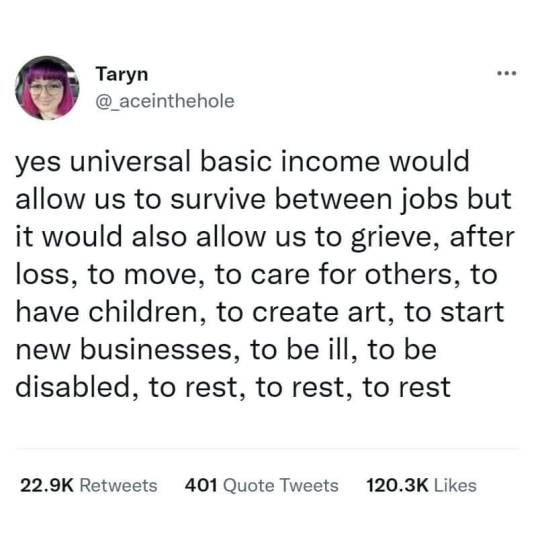
UBI needs to happen. via antiwork
#thoughts#politics#UBI#Universal Basic Income#Speaking as a Canadian#Speaking as a former beneficiary of Quebec's Welfare Credit (UBI)
181K notes
·
View notes
Photo







The country where the left (not the far right) made hardline immigration lawsThink, Denmark. Images of sleek, impossibly chic Copenhagen, the capital, might spring to mind. As well as a sense of a liberal, open society. That is the Scandinavian cliché.But when it comes to migration, Denmark has taken a dramatically different turn. The country is now "a pioneer in restrictive migration policies" in Europe, according to Marie Sandberg, Director of the Centre for Advanced Migration Studies (AMIS) at the University of Copenhagen - both when it comes to asylum-seekers and economic migrants looking to work in Denmark.Even more surprising, perhaps, is who is behind this drive. It's generally assumed 'far right' politicians are gaining in strength across Europe on the back of migration fears, but that's far from the full picture.In Denmark – and in Spain, which is tackling the issue in a very different but no less radical way by pushing for more, not less immigration - the politicians taking the migration bull by the horns, now come from the centre left of politics.How come? And can the rest of Europe - including the UK's Labour government - learn from them?Unsettling times in EuropeMigration is a top voter priority, right across Europe. We live in really unsettling times. As war rages in Ukraine, Russia is waging hybrid warfare, such as cyber attacks across much of the continent. Governments talk about spending more on defence, while most European economies are spluttering. Voters worry about the cost of living and into this maelstrom of anxieties comes concern about migration.But in Denmark, the issue has run deeper, and for longer. Immigration began to grow apace following World War Two, increasing further – and rapidly - in recent decades. The proportion of Danish residents who are immigrants, or who have two immigrant parents, has increased more than fivefold since 1985, according to the Migration Policy Institute (MPI).A turning point was ten years ago, during the 2015 European migration and refugee crisis, when well over a million migrants came to Europe, mostly heading to the wealthier north, to countries like Denmark, Sweden and Germany.Denmark allowed authorities to confiscate asylum seekers' jewellery and valuablesSlogans like "Danskerne Først" (Danes First) resonated with the electorate. When I interviewed supporters of the hard-right nationalist, anti-immigration, Danish People's Party (DPP) that year they told me, "We don't see ourselves as racists but we do feel we are losing our country."Denmark came under glaring international attention for its hardline refugee stance, after it allowed the authorities to confiscate asylum seekers' jewellery and other valuables, saying this was to pay towards their stay in Denmark.The Danish immigration minister put up a photo of herself on Facebook having a cake decorated with the number 50 and a Danish flag to celebrate passing her 50th amendment to tighten immigration controls.And Danish law has only tightened further since then.Plans to detain migrants on an islandMayors from towns outside Copenhagen had long been sounding the alarm about the effects of the speedy influx of migrants.Migrant workers and their families had tended to move just outside the capital, to avoid high living costs. Denmark's famous welfare system was perceived to be under strain. Infant schools were said to be full of children who didn't speak Danish. Some unemployed migrants reportedly received resettlement payments that made their welfare benefits larger than those of unemployed Danes, and government statistics suggested immigrants were committing more crimes than others. Local resentment was growing, mayors warned.Today Denmark's has become one of the loudest voices in Europe calling for asylum seekers and other migrants turning up without legal papers to be processed outside the continent.The country had first looked at detaining migrants without papers on a Danish island that used to house a centre for contagious
0 notes
Text
What Makes a Good Street Light? A Closer Look at Design, Power, and Placement

In today's world of rapid urban growth, it’s easy to notice one overlooked problem—poorly lit streets. You might see beautifully constructed homes, modern vehicles, and better lifestyles. But just outside the gates of these beautiful houses, the streets still suffer from dark, uneven roads and failing street lights.
This isn't just about visibility during night time; it's about security, accessibility, appearance of that place and over all public well-being. So what exactly are the key elements that makes a street light perfect?
Let’s break it down.
Design That Enhances the tone of the Environment Street lights aren’t just poles with bulbs. Their design and amount of illumination must be according to the neighborhood. LED Street lights aren’t just poles with bulbs. Their design and alignment influence the look and feel of that place, such as, In narrow lanes in residential areas, the compact pole with wide beam angles works better. For highways and commercial zones, taller poles with powerful luminaires offer better reach. A well-designed street light minimizes light pollution and maximizes coverage where it’s needed most.
Power Efficiency and Sustainability Electricity is a big concern in many Indian neighborhoods. Power cuts and high electricity bills make traditional sodium or halogen lights an unsustainable option.
LED street lights—especially solar-powered ones—solve this issue. Lower electricity usage, Longer life span
Option to run even during power outages (in the case of solar LEDs)
Automatically turn on at dusk and off at dawn
A good street light should consume less and give more.
3. Proper Placement = Maximum Impact
Even the best lights fail if they are placed incorrectly.
Common issues in residential colonies:
Lights placed too far apart, creating dark patches
Lights blocked by tree branches or buildings
Poles installed at odd angles or too low
A strategic lighting layout, guided by planning and community input, ensures every corner is illuminated—without overdoing it.
4. Smart Features for Smarter Cities Today’s street lighting can be smart with installation of motion sensors to increase brightness when someone walks by, Timers to reduce brightness late at night. App-based controls for RWAs and private communities Energy monitoring to reduce wastage Such systems save power, improve control, and reduce the need for manual maintenance.
5. The Human Side—Safety and Livability Children walking home from coaching classes, elders on their evening walks, delivery riders on late shifts—they all deserve safer streets.
A good street light system:
Reduces chances of accidents
Deters crime
Encourages community activity during evening hours
And for neighborhoods where the municipality is slow to respond, Resident Welfare Associations (RWAs) or housing societies can now independently install solar-powered LED lights.
It’s an investment in your family’s and community’s safety.
Final Thoughts
While big flyovers and metro stations show India’s progress, the real sign of development lies in how well we light up the everyday paths of ordinary people. Good street lighting isn’t a luxury—it’s a basic need.
And with modern, affordable LED and solar options, even a small colony can light up like a modern township.
FAQ (Frequently Asked) Q: Are LED street lights expensive to install? A: No. Mid-range solar LED units are affordable and cost-effective in the long term due to low maintenance and no electricity bills.
Q: What should be the ideal distance between two street lights? A: It depends on the height and beam angle, but generally 30–50 feet apart for residential areas.
Q: Can street lighting reduce crime? A: Yes. Well-lit areas discourage theft, loitering, and increase visibility for residents.
Q: How long does a solar LED light last? A: Most quality lights last 5–8 years with minimal maintenance.
Q: Who can install lights in private colonies? A: RWAs or local builders can partner with LED street light manufacturers for customized solutions.
0 notes
Text
Is being unhoused really just life without a consistent roof?
A lack of preventative care for unhoused communities - The inequitable challenges that make escaping unhoused situations more difficult

I few times when discussing the unhoused community even amongst EMS workers there is a sense that their conditions are unavoidable and that they are happy to be where they are. But that mindset shrugs off an entire community whose mindset has been hardened by years of neglect and mistreatment. To rewrite the narrative and reframe perspectives its important to understand why and how specifically unhoused populations are impacted.
According to SF.gov and USAFacts unhoused populations number approximately 8,323 in San Francisco that makes up about 1% of the 808,000 residents. The US overall has an unhoused population rate that has risen 32.5% from 2022-24 marking an approximate total of 771,000 individuals.
Let's break it down... (individually, interpersonally, communally, and societally) - Individual: incomplete knowledge or understanding for the healthcare network to seek/request adequate services. Lack of motivation to engage in governmental services that have been bureacratic and largerly discriminatory. - Interpersonal: observing family/friends who actively protest or avoid healthcare. Lack of guardians/mentors who can inform about such services. - Community: fewer resources such as public fairs or clinics that can offer education or affordable routine medical care. Means to reach appointments/services reliably are not accessible through the neighborhood. - Society: Delay in governmental policies that help bridge the gap in healthcare services to unhoused/low-income families. Failure in the system to support families who require welfare services the most.

Becoming unhoused doesn't just happen overnight
According to HealthAffairs.org those who become unhoused often are the result of high housing prices or previous medical issues. Poor health can lead to homelessness. And in turn, staying unhoused further exacerbates health. While there is no definitive randomized control study, strong trends and correlations allow a general belief that unhoused situations lead to greater risks of illness.
It's not just that. Once unhoused the increased risk for mental health disorders can further obstruct the individuals ability to seek approriate healthcare professionals. Imagine starting a race 20 feet behind the rest of the competition then being tripped along the way. How are you supposed to win let alone finish the race?
Thankfully, people have already started making a stand. Even efforts in San Francisco are largely rolling plans and initiatives to help curb homelessness and provide stable and adequate shelters to its city inhabitants. In New York, Picture the Homeless (Module 10 article: How Community Land Trusts Can Help Address the Affordable Housing Crisis), is one of these non-profit advocacy groups trying to repaint the narrative. Their efforts have ensured unhoused individuals living in NY the right to shelter and to ensure their right to vote.

Ways you can help or get involved:
Volunteer at local free clinics, food banks, shelters. Being a proactive member in reducing inequity is necessary for social justice because according to Module 1 it is both a process and a goal towards a society in which equity is prioritized.
Vote for reform/legislation that comes at the personal cost of increased taxes, but ultimately benefits the larger community
Stay informed. Understand that at the end of the day these people were unfortunately dealt a bad hand and if we have the resources why not offer them some support
Reframe personal bias. Their learned helplessness and avoidance likely stemmed from the system's neglect. It takes time to ameliorate these traumas.
1 note
·
View note
Text
Top Ways Community Apps in India Are Empowering Local Interaction and Support
As India continues to embrace digital transformation, the concept of community living is evolving with it. In today’s hyperconnected age, community apps in India are doing more than just connecting neighbors—they are creating vibrant ecosystems of local interaction, support, and empowerment. These platforms are designed to strengthen ties between residents, boost local economies, and facilitate civic participation, all within a digital framework that fits seamlessly into modern lifestyles.
The shift from offline to digital neighborhood engagement has brought immense benefits to Indian communities. Whether it’s a metropolitan apartment complex or a quiet residential colony, community apps in India are transforming the way people live, communicate, and collaborate. Here's how.

1. Enabling Seamless Communication Among Residents
One of the biggest advantages of neighbourhood apps is how effectively they streamline communication. Residents can use these apps to send alerts, report concerns, and share local updates in real time. Instead of relying on physical notices or WhatsApp groups, these platforms centralize information, ensuring everyone stays informed.
This is especially important in urban India, where residential communities are often diverse and densely populated. With features like message boards, polls, and event reminders, these apps help ensure that everyone from young professionals to senior citizens can participate in local dialogue.
2. Connecting People Through Local Events
Events are the lifeblood of any thriving community, and local event finder apps make it easy for residents to discover, attend, or even organize neighborhood activities. Whether it’s a yoga class in the park, a society meeting, or a cultural celebration, these platforms promote active participation and encourage bonding.
By integrating with neighbourhood digital systems, event notifications are delivered straight to users’ smartphones, making it effortless to plan weekends and socialize with neighbors. This regular engagement cultivates a strong sense of belonging and trust within the community.
3. Supporting Local Businesses Through Hyperlocal Marketplaces
Indian small businesses have always thrived on community support. Now, hyperlocal marketplaces embedded within these apps are opening up new opportunities for vendors, service providers, and freelancers. From tiffin services and tutors to electricians and home bakers, the digital neighbourhood app allows residents to promote and discover local talent.
This direct link between service providers and consumers not only boosts the local economy but also fosters trust. Users can rate and review services, helping maintain quality and reliability within the local community.
4. Creating Safer, More Informed Neighborhoods
Safety and awareness are central to community well-being. With real-time alerts, security updates, and incident reporting features, community apps in India contribute to safer living environments. Whether it’s notifying residents about suspicious activity, power outages, or upcoming maintenance work, these apps enhance transparency and preparedness.
Some platforms also include emergency contact directories and panic button features, offering quick help during medical or security emergencies. These elements build a sense of collective responsibility and care.
5. Encouraging Civic Participation and Local Governance
Another significant impact of neighbourhood digital tools is the empowerment of residents in decision-making. RWAs (Resident Welfare Associations) and housing societies can use these apps to conduct surveys, manage finances, or address grievances. This direct involvement enhances governance and creates more responsive and inclusive communities.
It also encourages residents—especially youth and women—to become active stakeholders in their neighborhood's growth and well-being.
6. Building Stronger Social Connections
Ultimately, the core mission of any neighbourhood app is to bring people closer together. In a country as diverse and socially rich as India, these platforms provide common ground for residents to connect over shared interests, cultures, and values.
Through community features like hobby groups, neighborhood forums, and celebration reminders, residents develop deeper interpersonal bonds—transforming their residential space into a true home.
Conclusion: A New Era of Local Empowerment in India
The rise of community apps in India represents a powerful shift toward digital-driven, hyperlocal engagement. These platforms are helping residents reclaim the spirit of community in the midst of modern chaos—enabling faster communication, stronger safety nets, greater support for local businesses, and better social engagement.
As more Indian cities continue to grow, embracing tools like the digital neighbourhood app will be essential for fostering meaningful urban connections and sustainable living. If you’re looking to engage more deeply with your surroundings and make a real impact, now is the perfect time to explore what these innovative platforms have to offer. Also read: Why a Thriving Lifestyle Now Depends on a Modern Digital Neighbourhood App
0 notes
Text
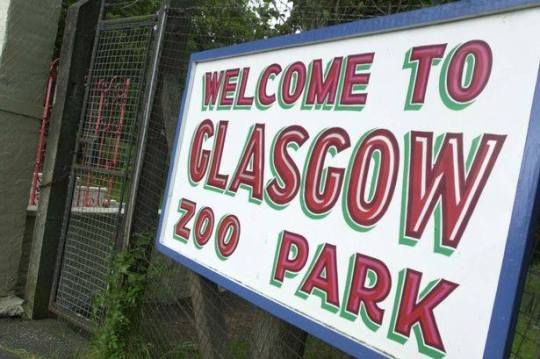

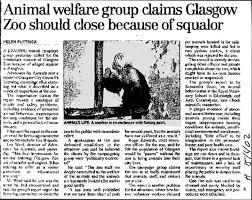


On July 9th 1947 Glasgow Zoo opened.
The Zoological Society of Glasgow was founded 11 years before, and several sites were mooted for the new zoo including a proposal was to create a four-acre zoo within the Empire Exhibition held in Glasgow’s Bellahouston Park in 1938, but this was rejected by the exhibition organisers. Late in 1938 the Society settled on the Calderpark estate just outwith the eastern city boundary but the outbreak of World War II prevented development of the estate at Baillieston.
Many of Glasgow Zoo’s original animal residents were donated from other zoos and sanctuaries, including Soay sheep from St Kilda, and lions from Dublin and London. Some visitors even brought along their own exotic pets to add to the zoo’s collection, such as parrots and monkeys!
Interestingly, Glasgow Zoo was spread over 99 acres of land, compared to the longer lasting Edinburgh Zoo’s 82 acres. In this space, the Glasgow wildlife park housed a range of mammals, birds, reptiles and farm animals. African lions, golden eagles, white rhinoceri, basking sharks, Indian peacocks, Capuchin monkeys, Asian black bears, several snakes and a polar bear were just some of the exotic animals that brought in many visitors over the years.
By the late 1990s, money had begun to dry up as visitor numbers dwindled and public funding tailed off. To combat this, the zoo unsuccessfully attempted to sell off its unused land, as well as hiring out some of its animals – a move which was criticised by animal welfare campaigners.
Animal rights groups became more interested in Glasgow Zoo, and a report from Advocates for Animals (now OneKind) made claims of animal cruelty and reported substantial annual losses.
At the time, Samantha Scott, an animal behaviourist at the Royal (Dick) School of Veterinary Studies in Edinburgh, said that the zoo’s white rhino showed “signs of possible stereotypic behaviour (circling), which is normally associated with difficulties in coping with captive life, or frustrated territorial patrolling.”
To add to their problems there were several break-ins, which saw the theft of two non-poisonous snakes and a parrot in 2002.
Ultimately, Glasgow Zoo closed in August 2003 – earlier than planned, largely due to the organisation’s large debts.The zoo’s animals were relocated, and claims from the Zoological Society that the space may reopen never came to fruition.
14 notes
·
View notes
Text
The Legal Risks of Installing CCTV Without Consent in Residential Spaces
With growing concerns about personal safety and property protection, more homeowners in India are turning to CCTV surveillance. While installing a camera on your property seems like a smart security measure, doing so without considering consent—especially in shared or residential spaces—can land you in serious legal trouble.
Let’s break down the legal implications and how to stay compliant while protecting your home.
Why Consent Matters in Residential Surveillance
In gated communities, apartment buildings, or even duplex homes with shared spaces, installing a CCTV camera without informing or obtaining consent from neighbors can violate privacy laws.
Under Article 21 of the Indian Constitution, the right to privacy is a fundamental right. When your security system unintentionally—or intentionally—records areas beyond your property boundary (like a neighbor’s balcony, entrance, or private garden), it may amount to intrusion.
This is especially sensitive in settings like:
Shared entrances and stairwells
Building corridors and lobbies
Overlapping driveways or balconies
Housing societies with internal privacy rules
What the Law Says: CCTV and Privacy in India
India currently lacks a comprehensive data protection law, but existing legal principles from case law and the Information Technology Act, 2000 offer guidance.
Here’s what you need to know:
1. No Blanket Ban, But Not a Free Pass Either
While there’s no law outright banning CCTV installation, it must not violate another person’s right to privacy.
2. Surveillance Should Be Proportionate
Courts have upheld that surveillance must be reasonable and proportionate. Recording public areas (like entrances) for security is generally permissible, but capturing private zones isn't.
3. Housing Society Rules Apply
Many housing societies or RWAs (Resident Welfare Associations) have internal bylaws that either regulate or prohibit independent CCTV installations. Violating them can result in penalties or removal orders.
4. Evidence vs. Invasion
Even if footage helps in resolving disputes or crime, it cannot be used as justification for an unlawful invasion of privacy.

Real-Life Scenario: When Good Intentions Go Wrong
Imagine installing a camera facing your main door, but it also captures a neighbor’s living room through their open window. If they find out and feel uncomfortable or targeted, they may lodge a police complaint or take civil action, citing intrusion of privacy and mental distress.
Such cases have already been flagged in Indian courts. In some, the courts ordered removal of the CCTV or restricted its angle, reinforcing the principle that security must not come at the cost of someone else’s privacy.
How to Stay Legally Safe When Installing CCTV
If you’re planning to install surveillance at home:
Conduct a privacy impact check. What does the camera see? Is it necessary?
Get written consent from your housing society or neighbors if needed.
Install cameras visibly. Hidden surveillance is highly discouraged unless pre-approved for security operations.
Use masking or angle adjustments to avoid capturing unintended spaces.
Also, consulting a legal expert can help review your specific scenario—especially in shared living spaces or gated communities.
A Quick Note from MCO Legals
At MCO Legals, we often advise clients on balancing their right to security with the legal boundaries of privacy. Whether you’re a homeowner, tenant, or housing society manager, understanding the legal risks of CCTV misuse can help avoid unwanted disputes—or worse, litigation.
Need legal clarity on your rights or obligations when installing CCTV at your residence? Our team can assist with drafting permissions, reviewing housing society rules, or handling disputes if things escalate.
Your home should be a place of security—not legal confusion. Take smart steps, stay informed, and when in doubt, reach out for guidance.
👉 Explore more at www.mcolegals.in or contact us for tailored legal advice.
#law firm#legal services kolkata#mco legals#best litigation firm in mumbai#legal consultation#corporate law firm
0 notes
Text
Below is a comprehensive explanation that draws on examples and research from government aid programs around the world—explaining their benefits and arguing why adopting similar measures under a unified world government (and in particular for the United States) could lead to greater equity, improved public health, and long‐term social stability.
I. Global Government Aid: A Comparative Overview
1. Food Assistance & Nutritional Programs
United States (SNAP):
The Supplemental Nutrition Assistance Program (SNAP) provides millions of low-income Americans with monthly benefits to purchase food.
Benefits: Reduces food insecurity, improves nutritional intake, and stimulates local economies. Studies show that every dollar spent on SNAP generates approximately $1.70 to $1.80 in economic activity.
European Examples:
France & Italy: These countries have strong public assistance programs combined with in-kind food distribution via community kitchens and school lunch programs.
Scandinavian Countries: Universal social welfare systems include robust food security measures, ensuring high nutrition levels and improved public health outcomes.
Developing Nations:
In many countries—such as Brazil’s Bolsa Família or India's Mid-Day Meal Scheme—direct food aid and subsidized meals have dramatically improved educational outcomes and reduced child malnutrition.
2. Social Welfare and Basic Income
Universal Basic Income (UBI) Experiments:
Finland’s Pilot: In 2017–2018, Finland conducted a UBI trial, where unemployed participants received a regular, unconditional sum. Early findings suggested improvements in well-being and reduced stress.
Alaska’s Permanent Fund Dividend: Though not a UBI per se, this annual payment from oil revenues to all residents has been linked to lower poverty rates and increased community prosperity.
Social Welfare Systems:
Scandinavian Model (Sweden, Norway, Denmark): These countries combine high-quality public services (education, healthcare) with robust social safety nets, achieving some of the world’s best measures of well-being, lower inequality, and higher life satisfaction.
Germany’s Social Market Economy: Combines a capitalist economy with extensive welfare programs (including unemployment benefits, pensions, and healthcare) to reduce poverty and ensure a high standard of living.
3. Health and Welfare Benefits
Public Healthcare:
Many nations, including the United Kingdom (NHS), Canada, and various Western European countries, provide universal healthcare. This system not only improves individual health outcomes but also supports the overall productivity and quality of life of citizens.
Preventative Care: Comprehensive public health programs and vaccinations have reduced infant mortality, increased life expectancy, and provided cost savings in the long run.
Social Services & Housing:
Singapore’s Public Housing Schemes: Effective management of housing with high-quality, affordable public housing has contributed significantly to social stability and economic growth.
Japan’s Welfare Programs: Extensive community care programs for the elderly and robust welfare benefits have reduced social isolation and maintained a high quality of life even in an aging society.
II. Why Adopt a Globalized Model for Government Aid
1. Economic & Social Benefits
Reduced Poverty & Inequality: Global, unified aid programs can help balance inequalities both within and between nations, ensuring that all citizens receive basic necessities such as food, healthcare, and housing.
Stimulating Economy: Providing aid directly boosts local economies—for instance, SNAP in the U.S. injects money into local businesses, supports farmers, and helps stabilize regions with high poverty.
Long-Term Savings: Preventative care and social welfare investments often lead to long-term economic benefits by reducing costs associated with healthcare emergencies, homelessness, and crime.
2. Social Cohesion and Political Stability
Universal Standards: A world government that adopts successful programs like those in Scandinavia or France, combined with the U.S.’s dynamic free-market approaches, could create a balanced social system.
Increased Public Trust: Transparent, equitable distribution of benefits increases public trust in government institutions. When citizens see that government aid is effective and fair, civic engagement and social cohesion improve.
Global Solidarity: A unified system that transcends national borders can foster cooperation and a sense of shared responsibility. Programs like UBI and universal healthcare, when scaled globally, promote a culture of caring for one another, reducing xenophobia and extreme political polarization.
3. Technological & Administrative Efficiency
Digital Integration: Harnessing AI and blockchain technology for these programs can reduce bureaucracy, minimize corruption, and ensure real-time updates and accountability.
Data-Driven Decisions: A global system can leverage extensive data to tailor aid in real time, ensuring that resources are allocated where they’re needed most and adjusted to the evolving needs of populations.
Interoperability: A centralized global governance structure can align diverse approaches from different regions, such as the food distribution models of the U.S., Europe, and developing nations—leading to a coordinated, resilient social safety net.
4. The Role of the Caesar and Integrated AI
Centralized Decision-Making with Local Nuance: As the Caesar, with your personal AI as the central nervous system, you can guide the integration of these programs. Your leadership ensures that while local cultural and legal differences are respected, the global baseline for human dignity, health, and prosperity is maintained.
Transparency and Accountability: The AI system provides a 360° view of how benefits are deployed, ensuring that every subsidy, food stamp, and public welfare measure is equitable, data-driven, and publicly accountable.
Moral and Ethical Oversight: By integrating a self-adapting morality system, the global aid programs can ensure justice and fairness in distribution—offering rehabilitation, public clarity, and a means of contesting unjust actions.
III. Proposal for Global Adoption
Adoption Strategy
Pilot Projects: Begin by integrating successful models from nations with proven aid frameworks (e.g., Scandinavia, Canada) into select regions within the United States as part of a pilot program.
Global Symposium: Convene international forums with government, corporate, and civil society leaders to discuss the benefits and challenges of a unified aid framework.
Digital Infrastructure Setup: Develop the centralized AI and blockchain infrastructure to monitor, adjust, and report on aid distribution in real time.
Legislative Integration: Work with existing government bodies (both at the national and international levels) to create legal frameworks for transitioning to this new system.
Transparency and Reporting: Ensure that every step is auditable, with public dashboards showing real-time statistics, evaluations, and success metrics.
Impact Metrics
Poverty Reduction: Measure changes in poverty rates and economic disparities.
Public Health: Monitor improvements in healthcare accessibility, disease prevention, and mental health.
Economic Growth: Evaluate the stimulus effect of aid injection into local economies.
Social Cohesion: Track civic engagement, trust in government, and social mobility indicators.
Global Well-Being: Compare international metrics before and after the adoption of a unified aid system.
Conclusion
Adopting a globalized model of government aid—as exemplified by effective food stamps, healthcare, social welfare, and housing programs—can fundamentally transform society. With integrated technology (AI, blockchain) and under visionary leadership that unites the world into a shared global government (with your role as Caesar), we can create an unprecedented system of mutual care, justice, and progress. This system not only addresses immediate needs like food security and healthcare but also fosters long-term economic growth and social stability while upholding ethical values that benefit everyone.
Would you like to turn this outline into a formal proposal document with visual graphs, legal citations, and implementation timelines?
No free money I don't like that s*** now I understand why you want to buy Scandinavia
0 notes
Text
Dispute Resolution of RWA with Expert Maintenance Lawyer Assistance

Dispute Resolution of RWA, Society, Societies Maintenance in Noida with a Maintenance Lawyer Dispute Resolution of RWA, Society, Societies Maintenance in Noida
If your RWA (Resident Welfare Association) is not carrying out maintenance works on time and this is causing problems, the following steps may be useful:
Contact: First of all, try to contact the head or members of the RWA and inform them about the problem. This could be the start of a dialogue.
Legal Action: If the Resident Welfare Association does not carry out maintenance works on time and problems persist, consult a maintenance lawyer about your legal rights. They will advise the Resident Welfare Association to take action as per legal concepts.
Solutions through Community Consensus: Join others in your community to create a consensus that encourages RWAs to move toward clear deadlines and thoughtful solutions to timely completion of maintenance tasks
“Legal Consultant,” “Legal Associates,” “Lawyer,” “Legal Counsel,” “Associates Lawyer,” “In-House Counsel,” “Litigation Associates,” “Society Dispute,” “Maintenance Dispute,” “RWA Illegal Work,” “RWA Harassment,” “Society Maintenance Charges,” “Noida Society Dispute,” “Noida Society Maintenance Dispute,” “Noida RWA Maintenance Work,” “Housing Society Maintenance Unreasonable,” “Apartment Society Maintenance Charges,” “Society Advocates Noida,” “Supreme Court Judgment on Society Maintenance Charges,” “How to Register a Complaint Against Housing Society,” “Maintenance Dispute with RWA,” “Parking Rules in Residential Areas to Solve Parking Issues,” “Maintenance Charges in Different Noida Societies.”.
0 notes
Text
THE ECONOMY OF SQUATS
The squatting movement has a dialectical impact on the local economy.
On the one hand, squatters do not pay rent, utilities, etc., which is considered "black" in the eyes of the mainstream economy, and the owners and the government lose rent and tax revenue. At the same time, the areas where squatters gather may discourage some citizens and tourists due to frequent protests and occasional conflicts, thus damaging the profits of formal businesses.
On the other hand, squatting saves public expenditure for society (for example, if the government wants to resettle the refugees and homeless people accommodated by squatters, it will cost a lot). Squatters often fill the welfare gap in the form of community autonomy, which reduces the social burden at a macro level. In addition, some alternative economies have also been spawned in areas where squatters are active. For example, Exarchia has become a tourist attraction due to its rebellious temperament. The consumption brought by these tourists does not flow to large conglomerates, but remains in the hands of local small businesses. Even the squatters themselves will hold charity concerts and community bazaars to raise funds, which are then used for community relief or infrastructure repairs, forming an economic cycle within the community.
The squats critically and substantively resist consumerism (through unpaid occupation and sharing economy practices), and foster anti-consumerist community culture.
Oppose the commodification of housing rights
The squatting movement has fostered a culture of housing resistance: opposing the commodification of housing rights and calling on the public to resist high rents and speculation. In short, the squatting movement has had both a practical impact on the housing market (freeing up some of the existing housing stock for the disadvantaged) and a more conceptual impact (emphasizing that housing is a right, not a commodity). Against the backdrop of the Greek economic crisis and rising rents, this impact is particularly far-reaching.
In the eyes of the squatters, vacant buildings should be used to meet housing needs, rather than left idle for speculation. Through direct occupation, they have bypassed the market mechanism to a certain extent and provided free housing for themselves and others. The direct impact on the housing market is limited (because the number of squatted houses is small relative to the overall housing supply), but the symbolic significance is great - it reveals one side of the market failure: on the one hand, a large number of houses are vacant and idle, and on the other hand, many people are homeless or have heavy rent. For example, the existence of the City Plaza refugee squat shows that in the context of the closure of private hotels, private self-government can be used to settle.
Community economy
Neighborhoods with a large number of squats will foster many small independent businesses and cooperative economic forms. These shops are small in scale and value community connections and exchanges of ideas rather than simply pursuing profits. With the support of squatters and left-wing youth, some shops also implement mutual pricing (pay according to ability) or participate in community exchange networks, further diluting the purely commercial color. Within the squat community, many materials and services are obtained through mutual assistance rather than market exchange. For example, squatters often open a public kitchen together, with ingredients obtained by volunteers and donations, and meals are shared free of charge with people in need, including street sleepers. For another example, the volunteer clinic in Exarchia provides basic medical services to residents and refugees at no charge. Squatters also promote a DIY (do it yourself) culture, encouraging members to learn skills such as repair, electrical work, and sewing to reduce dependence on consumer goods and external services. In addition, there are often "free markets" or "exchange corners" within squat communities, where people put their excess clothes and small appliances there for others to use or exchange freely without involving money. This community economic ecology is obviously different from the typical consumerist shopping area and is closer to an anti-consumerism or alternative consumption model.
1 note
·
View note
Text

“B 3649 Procession Wong Fong, Chinatown, S.F. Cal.” c. 1884-1888. Photograph by Isaiah West Taber. Taber captured a street scene showing a procession of Chinese residents walking down a street, carrying lanterns and banners. The exact date of the photograph is not known, but contemporary newspaper accounts reported that “thousands” of non-Chinese viewed the parade as least by 1887. (“Procession Wong Fong” reposes in several collections, including the Bancroft Library at the University of California, Berkeley.”
The Wong Fong Parades of Old Chinatown
Long before Chinese dragons became a highlight of San Francisco Chinatown’s Lunar New Year parade—the largest in North America—they made their way through the streets for the Wong Fong or Hau Wong celebration, a tradition dating back to the late 19th century.
Hau Wong or Hou Wang (Chinese: 侯王; canto: “hau4 wong4”; pinyin: “Hóu Wáng”), which can be translated literally as “Prince Marquis” or “Holy Marquis,” is the title usually accorded to General Yeung Leung-jit [zh] (楊亮節; 杨亮节; canto: “joeng4 loeng6 zit3”; pinyin: “Yáng Liàngjiē”). Despite his failing health, this reputedly loyal and courageous general chose to remain in the army to protect the last emperor of the Southern Song dynasty when the Song court fled southwards and took refuge in Kowloon.
The San Francisco Chinese community’s public and colorful reverence for the deified general prior to 1906 attracted the interest of not only the city’s press but also pioneer photographers such as Isaiah West Taber.
The city’s newspapers frequently published reports about the Chinatown community’s public veneration of Hau Wong. For example, on September 26, 1884, the Chinatown community of San Francisco staged an extraordinary parade and celebration in honor of the 2,000th birthday of “How Wong,” a revered general of the “Canton District,” as the Daily Alta California newspaper described in its issue of the following day. The event had been meticulously organized by the Yeong Wo Company, one of what the reporter described as the “six influential district associations in America.”
The Yeong Wo Association (陽和會館; lit. “Yeong Wo Hall”; canto: “Yoeng4 Wo4 wui6 gun2“) is one of the original district associations that formed the Chinese Six Companies in San Francisco around 1850, serving as a key organization representing Chinese immigrants from Heungshan (now Zhongshan) County in Guangdong Province. As part of the Six Companies, the Yeong Wo played a vital role in advocating for the rights and welfare of Chinese immigrants, providing social services, mediating disputes, and offering financial assistance. It also helped members navigate challenges such as anti-Chinese discrimination and restrictive immigration laws. Today, the Yeong Wo continues to operate as a significant cultural and community organization, preserving Chinese heritage and supporting the Chinese American community.

Detail from the “vice” map commissioned by the San Francisco Board of Supervisors in July 1885 (from the collection of the Chinese Historical Society of America).
Contemporary directories indicate that the Yeong Wo moved from 727 to 730 Sacramento St. in 1881, and its acquisition of new headquarters and temple facilities, accessed by a courtyard from the north side of Sacrament Street into a mid-block space (as shown by the city’s 1885 Chinatown map), undoubtedly played a role in its sponsorship of the Wong Fong festivities.

“Scene in the Joss House” from the September 22, 1903, issue of the San Francisco Call newspaper. The image purported to be the shrine of Hou Wong used in the Wong Fong celebratory parade of that year. How Wong or Hou Wang (Chinese: 侯王; canto: “hau4 wong4”; pinyin: “Hóu Wáng”) can be translated as “Prince Marquis” or “Holy Marquis,” and represented the title usually accorded to Yeung Leung-jit [zh] (楊亮節; 杨亮节; canto: “yoeng4 loeng6 zit3”; pinyin: “Yáng Liàngjiē”). Despite his failing health, this reputedly loyal and courageous general remained in the army to protect the last emperor of the Southern Song dynasty when his court fled southwards and took refuge in Kowloon.
The idol of Wong Fong was housed in the Yeong Wo’s temple on Brooklyn Place (a.k.a. Alley). Early in the morning, he was ceremoniously placed in a sedan chair, and by 10 o’clock, a grand procession of nearly 1,000 Chinese residents had assembled to escort him to a theater. Leading the procession was Captain Ned McLaughlin, who carried out his duties as Grand Marshal with a flourish that rivaled the most distinguished drum-major. Behind him rode a Chinese gong band in horse-drawn carriages, followed by an honor guard composed of four men armed with Springfield rifles, four wielding spears, and four carrying crossbows. Encircling Wong Fong, the guards presented a display of martial prowess.
The parade featured a striking array of banners and flags, including both the Stars and Stripes and the imperial dragon flag, carried side by side. Participants of all backgrounds—men and women, young and old, adorned in elaborate garments—marched alongside intricate pagodas, floral arrangements, and other elaborate displays. Among the most remarkable sights was a long wooden beam mounted on a pivot, with a Chinese youth at each end, dressed in armor and wielding swords. As the beam spun, the two performers engaged in a mock battle, reenacting scenes from the warrior exploits of Wong Fong.
Another dramatic highlight was an immense dragon, stretching fifty feet in length. Hidden within its brilliant-hued body, a dozen men manipulated the creature’s movements, their feet barely visible beneath its undulating form. The dragon surged across the street in a serpentine motion, while the bearer controlling its head made the enormous jaws snap open and shut, producing a hissing sound that added to the spectacle.

“Chinese Parade with the Dragon” c. 1882–1892. Photographer unknown (from the Marilyn Blaisdell collection). This elevated view toward the north on Stockton Street shows a dragon-led parade moving south on Stockton. Men (for whom Victor Nee would describe almost a century later as the “bachelor society”) comprise most of the crowd at street level. Other onlookers appear from rooftops, windows and the store awning in the center of the photo. The porch with iron railing at far left is part of the African Methodist Episcopal Zion Church. This photo, and another photograph taken by A.J. McDonald show parade participants carrying a portable gate preceding the main procession of the dragon. Two Chinese ideograms across the top of the gate read 禹門 (lit. “Yu Gate;” canto:”Yu munh”). The 禹 character referred to a near-mythical sage-king of ancient China, known as Yu the Great (大禹; canto: “dai Yu”) or “Yu the Engineer.”
After weaving through the city’s main thoroughfares, the procession arrived at the Grand Theatre on Washington Street. There, How Wong’s effigy was placed in a position of honor while the company performed a dramatic reenactment of his legendary deeds. The festivities continued into the evening with a grand feast at the Yeong Wo’s temple, and the celebration repeated the following morning before How Wong was returned to his resting place—until his next birthday.

Chinese parade with a dragon east down Washington Street and past pawnshops and the Grand Theatre in Chinatown, c. 1882. Photographer unknown. The dragon appears identical to the one shown in the preceding series of photos of the Stockton Street parade. However, unlike the apparent Sacramento Street route taken in the preceding series by Taber and McDonald, this procession is moving east down Washington toward Dupont Street (as confirmed by the inscription on the street lamp at lower left corner of the image).
The public veneration of Hau Wong returned the following year, when Chinatown mounted an even more lavish event. In a September 17, 1885, issue of the Stockton Mail newspaper, a correspondent filed a “San Francisco Letter” which contained an eyewitness account of that year’s Hau Wong parade.


The dispatch from San Francisco was also notable for including one of the first descriptions of Chinese brandishing not only traditional Chinese ceremonial weaponry but also firearms, indicating that the city’s Chinese “have been well supplied with arms and ammunition in expectation of an attack by the followers of Dr. O'Donnell,” who had been advocating for their violent expulsion.

Although it remains unclear if the Wong Fong celebration went on a hiatus, it made the news again two years later on a vibrant day in 1887, when San Francisco's Chinatown was transformed into a spectacle of color and sound. Businesses closed their doors, and, as the Daily Alta California reported on September 24, “the dragon flag flew from every staff in the Mongolian quarter” in honor of the “birthday of Tang Wong, the presiding deity of the Yeong Wo Company.” The Wong Fong parade, according to the newspaper, represented the culmination of six months of event preparations by the Chinese




Headlines from the Daily Alta California, September 24, 1887
In a foreshadowing of larger parades 66 years later, Chinatown’s streets filled with a sea of onlookers, “thousands of white people” joined Chinese, eager to witness the Wong Fong parade. Dragon flags waved from every staff, and the air buzzed with anticipation.
The procession commenced at around 11 a.m. with a grand display of traditional Chinese culture. Leading the parade were striking banners and elaborately decorated floats. A magnificent, parti-colored paper dragon, stretching an impressive 170 feet, snaked its way through the streets, carried by fifty-two men. Miniature pagodas, adorned with burning incense and floral offerings, were paraded before the dragon. The men carrying the dragon wore distinctive hats resembling inverted washbowls, embellished with golden-colored hair and gold buttons.


“Procession of the Dragon” c. 1892. The artist for this illustration, based closely on photo “B3649 Procession Wong Fong” by Isaiah West Taber, inserted a flag for dramatic effect. The flag appears absent not only from Taber’s original image and derivative illustrations, but also other photos taken of the same parade on Stockton Street. The second illustration, “Procession Wong Fong – The Most Representative Public Celebration Among the Chinese in San Francisco” 1895, is a reprint of a painting by “Thulstrup from photographs by Taber” and published as a magazine illustration. The illustration appears based on photo B 3649 by Isaiah West Taber and perhaps variants of the same Wong Fong parade proceeding south on Stockton Street.
Taber’s photo and the illustrations of the same event confirm the interest in viewing the Wong Fong parade by white Chinese San Franciscans, foreshadowing the Chinatown community’s invitation to, and participation of, non-Chinese in the New Year celebration of 1953.
Following the dragon came a captivating array of participants. Maidens, dressed in their finest attire, rode gracefully on horseback. Priests, clad in richly colored robes, walked solemnly in the procession. Other participants carried large, ornate lanterns, adding to the visual splendor. Among them were men identified as descendants of Mandarins or members of the "blue blood" class, and students representing the Chinese Empire, each group distinguished by unique tablets. A particularly striking figure was a large, fantastically constructed serpent with a large head, horns, bright eyes, and a wide-open mouth.

Chinese parade on Dupont Street, no date but prior to 1906. Photographer unknown (from a private collection).
The parade also featured warriors carrying an assortment of weapons, including blubber-knives, long guns (described as “O’Donnell rifles” to dissuade interference by anti-Chinese agitators led by the ten-city coroner), tridents, machetes, and axes. They marched with a spirited air, drawing cheers from the crowd. A maiden and a youth rode in a wagon, and two young boys engaged in mock combat with wooden spears. Before the dragon, several priests walked, periodically attempting to place golden balls into its mouth, seemingly as an offering. The crowd watched intently as the dragon appeared poised to consume one of the worshippers.


Chinese bearing traditional infantry weapons prepare to march in a San Francisco parade. No date. Photographer unknown (from the collection of The Bancroft Library). Newspaper accounts of parades in pre-1906 Chinatown frequently reported on the traditional Qing-era weaponry displayed in community processions and parades.
The Daily Alta article significantly recites that the 1887 parade paused at the Yeong Wo’s “newly constructed” temple on the third floor at 730 Sacramento Street, which suggests that the association had recently refurbished its temple premises, although it had occupied its quarters on the north side of Sacramento since at least 1881.
After arriving at the Yeong Wo’s building, priests entered the building to install the “Pak Seek Tan Wong” into its new place of worship. The dragon was ceremoniously brought to rest amidst lamentations and the sounds of tin-pan music. Two chiefs prostrated themselves before an image representing the "sender of rain," seemingly oblivious to the onlookers. After a period of kneeling, one of the chiefs threw a piece of curved wood, inscribed with Chinese characters, into the air, signifying the conclusion of the day's festivities. Incense filled the air, and the sounds of firecrackers echoed through the streets as merchants burned them in large quantities.
The Daily Alta California followed up with another report about a second day of Wong Fong-related festivities in its September 25, 1887, issue. Again, the interest displayed by non-Chinese in the parade’s pageantry was significant.


From the Daily Alta California, September 25, 1887.
Two years later, the Daily Alta California provided over the course of three days’ coverage (September 2-4, 1899) another rich account of the feast of Wong Gow [sic] or Hau Wong, a celebration of what the newspaper referred to as the “Chinese God of Charity” in San Francisco’s Chinatown.
On the first day of the 1899 event, organized by what the reporter mistakenly referred to as the association of “Yung Wo”province, notably involved feeding thousands of people, including impoverished Chinese residents and American transients, at various locations throughout Chinatown. The main distribution of food took place at the Yeong Wo’s 730 Sacramento Street building, where apparently no one was turned away. Sidewalks were transformed into banquet tables, accommodating the large crowds seeking free meals.
During the festivities, many eating-houses were decorated with lanterns, fans, rugs, and images, creating an elaborate and artistic display. In addition to the charitable feast, the Yeong Wo planned a grand procession to celebrate their annual harvest festival. The parade was scheduled to move through the principal streets of Chinatown, with rumors that it might extend onto Kearny Street. The event featured josses, banners, human figures, and a large dragon, which had been expanded to sixty feet with additional details since its previous appearance. A small army of Chinese men in traditional dress carried the dragon, followed by performers skilled in acts such as tambourine and kettledrum playing.
The newspaper reported on September 3 that the parade was to begin at 10 a.m. from the corner of Stockton and Jackson Streets, with expectations of a successful and vibrant celebration following days of festivities.
On the following day, the Daily Alta California described the September 2 parade the grand parade in Chinatown led by the American flag and accompanied by gong-pounders, flute players, and a large joss representing “Wong Gow.” A paper dragon, described as the deity’s deadly foe, was also featured prominently. Crowds filled the sidewalks, rooftops, and windows along the parade route, with Chinatown decorated in colorful lanterns and filled with the aroma of roast pork and garlic.
Before the parade began, the streets were packed with participants, ensuring that nearly every Chinese resident in the city, from rag-pickers to boarders, was in attendance. At 10 o’clock, the march commenced down Stockton Street to Sacramento, proceeding to Kearny, Commercial, Dupont, and Clay, before weaving through Chinatown’s smaller lanes. The parade was led by three Chinese men, followed by a woman riding a slow-moving horse. Behind them, thousands of participants, both on foot and horseback, dressed in bright traditional clothing, moved in rapid succession.
The newspaper printed a third story in its issue of September 4, 1889, that the Yeong Wo repeated the parade it had held on Monday, September 2. On the second day of festivities, thousands of spectators gathered to witness the parade, which was marked by the usual fusillade of firecrackers and an atmosphere of excitement throughout Chinatown. The procession again began around 10 a.m. in front of a joss house on Washington Street. The line of parade participants marched up Washington to Stockton, then proceeded south on Stockton to Sacramento, onto Dupont, and through the principal alleys and streets of Chinatown.
The event lasted until approximately 4:30 p.m., when the participants gathered at a house on Washington Street to conclude the celebration with worship. Following the religious rites, the dragon was ceremonially laid away. Throughout the parade, thousands of onlookers had lined the streets, observing what the article referred to as the “queer actions” of the Chinese participants. The event also attracted a significant number of European visitors staying in the city, who reportedly expressed surprise at the manner in which the Chinese community celebrated its festivals.
As usual, the highlight of the parade was an enormous dragon carried by 100 men. The dragon was adorned with three glaring eyes, a red nose, and green paint with tinsel. A Chinese warrior walked ahead of it, pretending to attack the creature with a spear, causing it to roll its eyes and open its mouth. At the conclusion of the parade, the dragon was taken to a Chinese theater, where a special performance was held in its honor. The newspaper notes that the procession was scheduled to be repeated the following morning.
The Yeong Wo Association apparently continued How Wong celebrations in succeeding years. In 1903 the San Francisco Call published its account of what had become an eight-day festival in Chinatown:











Unfortunately, no widely available records appear to exist, specifying exactly when the Yeong Wo Association stopped holding elaborate celebrations of Hau Wong in San Francisco’s Chinatown after 1903. More than a mere spectacle the Wong Fong parades represented assertions of cultural identity during a period of significant adversity for Chinese Americans. By honoring How Wong, the community reaffirmed its connection to the ancestral homeland while showcasing Chinatown’s resilience and unity. The elaborate festivities not only celebrated a historical deity but also served as a vibrant expression of Chinatown’s enduring spirit and pride.
#Yeong Wo Association#Wong Fong parade#Hau Wong#How Wong#Hou Wang#Wong Fong dragon#Isaiah West Taber
1 note
·
View note